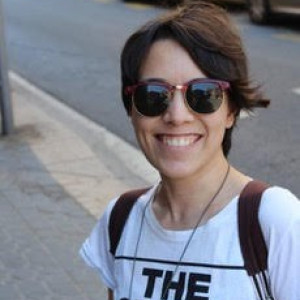How does working on your own projects help your freelance work?
Interview with Rosemary, a digital content marketing manager reveals must-see freelance tips
Working on your own projects is very important as you have complete flexibility that you might not have with clients.
With your own projects, it’s easier to test tweak and revise.
The more experience you have through trial and error then the better the job you will do for your clients.
Rosemary, a digital content marketing manager shares the freelance lessons she has learned over the years—see her tips & exceptional entrepreneurial wisdom.
Read full interview from Interview with Rosemary, a digital content marketing manager reveals must-see freelance tips.
Interview with Elizabeth, a graphic designer and art director
Working on my own projects allows me to generate ideas without fear of overstepping a client brief by wanting to create what I want rather than what they need.
It gives me an outlet to try my hand with new trends in design and gives my brain an avenue for fun when I’m working with complex corporate documents where creativity is limited.
Elizabeth provides the ultimate list of tips for aspiring freelancers and remote workers. Check out her game-changing tools, and advice for thriving as a freelancer.
Read full interview from Interview with Elizabeth, a graphic designer and art director.
Interview with Ascencia, a content marketer, and avid gig economy professional
English is not my first language, but Indonesian is. However, having learned it for over 15 years, I think I’m pretty good at it.
I have a personal blog, all written in English, and it has helped me showcase my English skills.
It shows clients how I’m able to use the language. If I’m applying for a content-related job, I always include my personal blog and my Medium profile.
A forgotten two-year-old Upwork account allowed Ascencia to become a content marketer—see how the gig economy has offered her an alternative path to success.
Read full interview from Interview with Ascencia, a content marketer, and avid gig economy professional.
Interview with Ben, a web developer who freelances from home
Over the years, I've had over a dozen different projects, everything from website ideas to hardware to video (I even managed to keep up vlogging for an entire year).
I find it's important to have something that you do that isn't work, because it acts as sort of a palette cleanser.
Working on all these weird projects has helped me develop a better sense of what a client might want, gives me the chance to play with new technology or learn new software, and gives me something to think about in a different way.
Several times, things that I have played with on my own have provided the seeds of suggestions to clients on how they might improve an aspect of their own business or software, and has definitely helped me improve my project planning and management skills.
Learn the tips and tricks Ben uses to stay productive while working remotely on a hybrid team
Read full interview from Interview with Ben, a web developer who freelances from home.
Interview with Jenna, a freelance writer who works remotely to help manage her health
At the moment, I work on my own projects when I don’t have paid work to do. But when I’m low on writing work I feel like I should be looking for more work instead of writing for my blog. I have to remind myself that working on my own projects is good for me (and my business) because it’s all connected.
Working on my professional site is important for achieving my long-term goals. Writing for my blog helps me improve my craft, plus I just really enjoy it, so I have to give myself permission to do it. It feels almost like an indulgence.
I think it’ll be much easier for me to balance these things once I’ve established myself a bit more; right now I’m still working on finding regular clients and meeting my monthly financial goals, so spending more time on paid work is a priority. Once I feel more secure, I plan to schedule my own projects into my calendar, so that I spend a set amount of time on them every week.
Jenna started working remotely after realizing her office job was causing health problems—now she works as a freelance writer and writes about self-improvement
Read full interview from Interview with Jenna, a freelance writer who works remotely to help manage her health.
Interview with Dane, a freelance writer and author with 7 published books
I was actually having a similar discussion with a client of mine who I’m ghostwriting a book for.
Essentially, I had to make sure that he had realistic expectations by explaining that it’s unlikely that his book will sell particularly well and that it certainly won’t pay for itself in terms of how much it’s cost for us to release it. I’ve written seven books and do okay for an indie writer, but the royalties on them don’t even cover the cost of my editor, my layout guy and my cover designer.
The real value of writing books comes in terms of the authority that it gives you.
In my case it allows me to charge a higher freelance rate because I have proven experience and a body of readers who enjoy my work.
For my client, it’ll open up keynote speaking opportunities and lead to potential new consulting work. So in a way, the books do pay for themselves – just not directly.
I suspect that much the same holds true for other creative industries. For example, if you’re a film-maker and you release a full-length movie, at best you might be able to monetise it with advertisements on YouTube. But having that full-length movie in your portfolio is going to look great and dramatically increase the chances that people will be willing to pay your rates.
Dane is a freelance writer and author who works remotely, and balances client work with writing his own books.
Read full interview from Interview with Dane, a freelance writer and author with 7 published books.
Interview with Cecilia, a content writer managing her remote career in Dubai
Other than being a creative outlet, it helps to build a network and continually hone in my skills. It's even helped me find clients!
Cecilia got her start translating blog posts, and in 2018 she went fully remote. See her tips for managing an international remote work career.
Read full interview from Interview with Cecilia, a content writer managing her remote career in Dubai.
Interview with John, an international business writer sharing 15 years of insights
It provides a creative outlet which is a nice break from client work—and allows me to return to work more motivated.
For over a decade, John has worked as an international business writer. See his insights on the state of remote work, freelancing, and attracting clients who are the right fit.
Read full interview from Interview with John, an international business writer sharing 15 years of insights.
Interview with Alyssa, a copywriter and content strategist
My projects give me even more opportunities to expand my writing and marketing skills, which I can apply to client projects.
Alyssa has found her rhythm as a freelancer and founder of the blog, Freelancing Flow—see her tips for keeping it all running smoothly.
Read full interview from Interview with Alyssa, a copywriter and content strategist .








